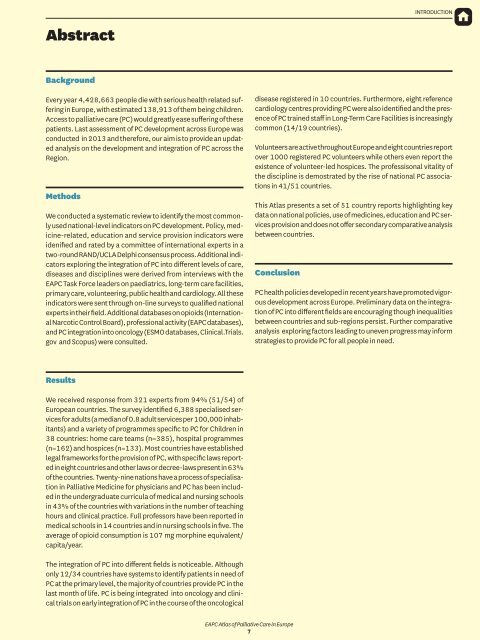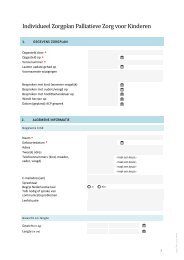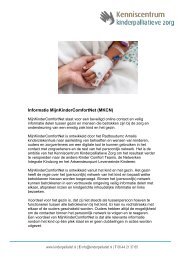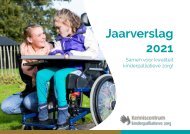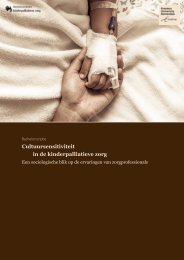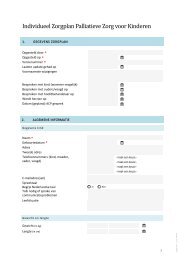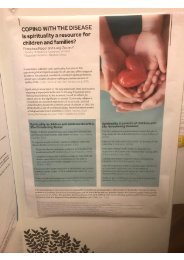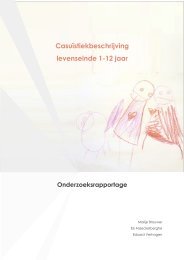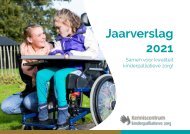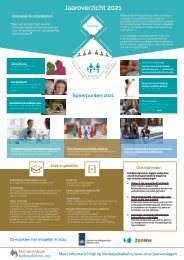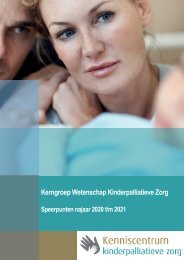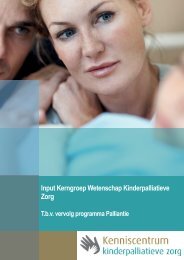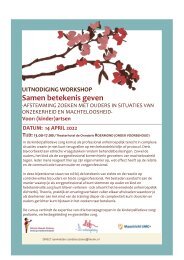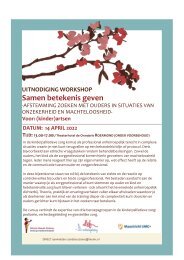EAPC Atlas of Palliative Care in Europe 2019
Conclusion: PC health policies developed in recent years have promoted vigorous development across Europe. Preliminary data on the integration of PC into different fields are encouraging though inequalities between countries and sub-regions persist. Further comparative analysis exploring factors leading to uneven progress may inform strategies to provide PC for all people in need. Per land is de stand van zaken van de (kinder)palliatieve zorg weergegeven.
Conclusion: PC health policies developed in recent years have promoted vigorous development across Europe. Preliminary data on the integration of PC into different fields are encouraging though inequalities between countries and sub-regions persist. Further comparative analysis exploring factors leading to uneven progress may inform strategies to provide PC for all people in need.
Per land is de stand van zaken van de (kinder)palliatieve zorg weergegeven.
Create successful ePaper yourself
Turn your PDF publications into a flip-book with our unique Google optimized e-Paper software.
Abstract<br />
INTRODUCTION<br />
B<br />
Background<br />
Every year 4,428,663 people die with serious health related suffer<strong>in</strong>g<br />
<strong>in</strong> <strong>Europe</strong>, with estimated 138,913 <strong>of</strong> them be<strong>in</strong>g children.<br />
Access to palliative care (PC) would greatly ease suffer<strong>in</strong>g <strong>of</strong> these<br />
patients. Last assessment <strong>of</strong> PC development across <strong>Europe</strong> was<br />
conducted <strong>in</strong> 2013 and therefore, our aim is to provide an updated<br />
analysis on the development and <strong>in</strong>tegration <strong>of</strong> PC across the<br />
Region.<br />
Methods<br />
We conducted a systematic review to identify the most commonly<br />
used national-level <strong>in</strong>dicators on PC development. Policy, medic<strong>in</strong>e-related,<br />
education and service provision <strong>in</strong>dicators were<br />
idenified and rated by a committee <strong>of</strong> <strong>in</strong>ternational experts <strong>in</strong> a<br />
two-round RAND/UCLA Delphi consensus process. Additional <strong>in</strong>dicators<br />
explor<strong>in</strong>g the <strong>in</strong>tegration <strong>of</strong> PC <strong>in</strong>to different levels <strong>of</strong> care,<br />
diseases and discipl<strong>in</strong>es were derived from <strong>in</strong>terviews with the<br />
<strong>EAPC</strong> Task Force leaders on paediatrics, long-term care facilities,<br />
primary care, volunteer<strong>in</strong>g, public health and cardiology. All these<br />
<strong>in</strong>dicators were sent through on-l<strong>in</strong>e surveys to qualified national<br />
experts <strong>in</strong> their field. Additional databases on opioids (International<br />
Narcotic Control Board), pr<strong>of</strong>essional activity (<strong>EAPC</strong> databases),<br />
and PC <strong>in</strong>tegration <strong>in</strong>to oncology (ESMO databases, Cl<strong>in</strong>ical.Trials.<br />
gov and Scopus) were consulted.<br />
disease registered <strong>in</strong> 10 countries. Furthermore, eight reference<br />
cardiology centres provid<strong>in</strong>g PC were also identified and the presence<br />
<strong>of</strong> PC tra<strong>in</strong>ed staff <strong>in</strong> Long-Term <strong>Care</strong> Facilities is <strong>in</strong>creas<strong>in</strong>gly<br />
common (14/19 countries).<br />
Volunteers are active throughout <strong>Europe</strong> and eight countries report<br />
over 1000 registered PC volunteers while others even report the<br />
existence <strong>of</strong> volunteer-led hospices. The pr<strong>of</strong>essisonal vitality <strong>of</strong><br />
the discipl<strong>in</strong>e is demostrated by the rise <strong>of</strong> national PC associations<br />
<strong>in</strong> 41/51 countries.<br />
This <strong>Atlas</strong> presents a set <strong>of</strong> 51 country reports highlight<strong>in</strong>g key<br />
data on national policies, use <strong>of</strong> medic<strong>in</strong>es, education and PC services<br />
provision and does not <strong>of</strong>fer secondary comparative analysis<br />
between countries.<br />
Conclusion<br />
PC health policies developed <strong>in</strong> recent years have promoted vigorous<br />
development across <strong>Europe</strong>. Prelim<strong>in</strong>ary data on the <strong>in</strong>tegration<br />
<strong>of</strong> PC <strong>in</strong>to different fields are encourag<strong>in</strong>g though <strong>in</strong>equalities<br />
between countries and sub-regions persist. Further comparative<br />
analysis explor<strong>in</strong>g factors lead<strong>in</strong>g to uneven progress may <strong>in</strong>form<br />
strategies to provide PC for all people <strong>in</strong> need.<br />
Results<br />
We received response from 321 experts from 94% (51/54) <strong>of</strong><br />
<strong>Europe</strong>an countries. The survey identified 6,388 specialised services<br />
for adults (a median <strong>of</strong> 0.8 adult services per 100,000 <strong>in</strong>habitants)<br />
and a variety <strong>of</strong> programmes specific to PC for Children <strong>in</strong><br />
38 countries: home care teams (n=385), hospital programmes<br />
(n=162) and hospices (n=133). Most countries have established<br />
legal frameworks for the provision <strong>of</strong> PC, with specific laws reported<br />
<strong>in</strong> eight countries and other laws or decree-laws present <strong>in</strong> 63%<br />
<strong>of</strong> the countries. Twenty-n<strong>in</strong>e nations have a process <strong>of</strong> specialisation<br />
<strong>in</strong> <strong>Palliative</strong> Medic<strong>in</strong>e for physicians and PC has been <strong>in</strong>cluded<br />
<strong>in</strong> the undergraduate curricula <strong>of</strong> medical and nurs<strong>in</strong>g schools<br />
<strong>in</strong> 43% <strong>of</strong> the countries with variations <strong>in</strong> the number <strong>of</strong> teach<strong>in</strong>g<br />
hours and cl<strong>in</strong>ical practice. Full pr<strong>of</strong>essors have been reported <strong>in</strong><br />
medical schools <strong>in</strong> 14 countries and <strong>in</strong> nurs<strong>in</strong>g schools <strong>in</strong> five. The<br />
average <strong>of</strong> opioid consumption is 107 mg morph<strong>in</strong>e equivalent/<br />
capita/year.<br />
The <strong>in</strong>tegration <strong>of</strong> PC <strong>in</strong>to different fields is noticeable. Although<br />
only 12/34 countries have systems to identify patients <strong>in</strong> need <strong>of</strong><br />
PC at the primary level, the majority <strong>of</strong> countries provide PC <strong>in</strong> the<br />
last month <strong>of</strong> life. PC is be<strong>in</strong>g <strong>in</strong>tegrated <strong>in</strong>to oncology and cl<strong>in</strong>ical<br />
trials on early <strong>in</strong>tegration <strong>of</strong> PC <strong>in</strong> the course <strong>of</strong> the oncological<br />
<strong>EAPC</strong> <strong>Atlas</strong> <strong>of</strong> <strong>Palliative</strong> <strong>Care</strong> <strong>in</strong> <strong>Europe</strong><br />
7


